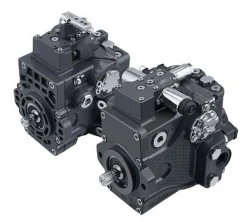Features and applications of axial piston pumps
2023-12-11
Axial piston pumps are a type of positive displacement pump that uses a set of pistons arranged in a circular array around a central shaft to generate fluid flow. These pumps are known for their efficiency, high pressure capabilities, and suitability for a variety of applications. Here are key features and applications of axial piston pumps:
Key Features:
1. Piston Arrangement:
- Circular Array: Axial piston pumps have pistons arranged in a circular pattern around a central drive shaft.
2. Positive Displacement:
- Fixed or Variable Displacement: Axial piston pumps can be fixed or variable displacement, meaning they move a fixed or variable volume of fluid with each rotation.
3. Reciprocating Motion:
- Axial Movement: The pistons move axially (in and out) within their cylinders as the central shaft rotates.
4. Pressure Compensation:
- Pressure Compensated Design: Some axial piston pumps are designed to automatically compensate for variations in pressure, providing stable performance under changing conditions.
5. Variable Speed Control:
- Variable Displacement Models: Variable displacement axial piston pumps can be controlled to adjust the flow rate according to system demands.
6. Efficiency:
- High Efficiency: Axial piston pumps are known for their high efficiency, especially in variable displacement models where the pump can adjust to the required flow.
7. Compact Design:
- Space Efficiency: The axial piston pump's compact design makes it suitable for applications where space is limited.
Applications:
1. Hydraulic Systems:
- Mobile and Industrial Hydraulics: Axial piston pumps are widely used in hydraulic systems for industrial machinery, construction equipment, and mobile applications.
2. Automotive Industry:
- Power Steering Systems: Axial piston pumps are commonly used in power steering systems in vehicles.
3. Aerospace Industry:
- Aircraft Hydraulic Systems: Axial piston pumps are employed in hydraulic systems in aircraft for various functions.
4. Oil and Gas Industry:
- Drilling Rigs: Used in hydraulic systems on drilling rigs for functions such as controlling the movement of drill bits.
5. Construction Machinery:
- Excavators, Loaders, and Cranes: Axial piston pumps are utilized in various construction equipment for hydraulic control.
6. Marine Applications:
- Marine Hydraulics: Used in hydraulic systems on ships for tasks such as steering and anchor control.
7. Manufacturing Machinery:
- Machine Tools: Axial piston pumps are used in manufacturing machinery for hydraulic control in machine tools.
8. Railway Systems:
- Train Braking Systems: Axial piston pumps are employed in hydraulic braking systems for trains.
9. Power Generation:
- Hydraulic Power Plants: Used in hydraulic power plants for fluid control in turbines.
Considerations:
1. Maintenance:
- Regular Inspection: As with any hydraulic system component, regular maintenance and inspection are essential for optimal performance.
2. Fluid Compatibility:
- Material Selection: Ensure that the materials used in the pump are compatible with the type of hydraulic fluid being used.
3. Pressure Ratings:
- Match to Application: Choose a pump with pressure ratings that meet the requirements of the specific application.
4. Temperature Limits:
- Operating Range: Be aware of the temperature limits of the pump to ensure it operates within its designed temperature range.
Axial piston pumps are a popular choice in hydraulic systems where high efficiency, variable speed control, and compact design are essential. Their versatility and adaptability make them suitable for a wide range of industries and applications.



